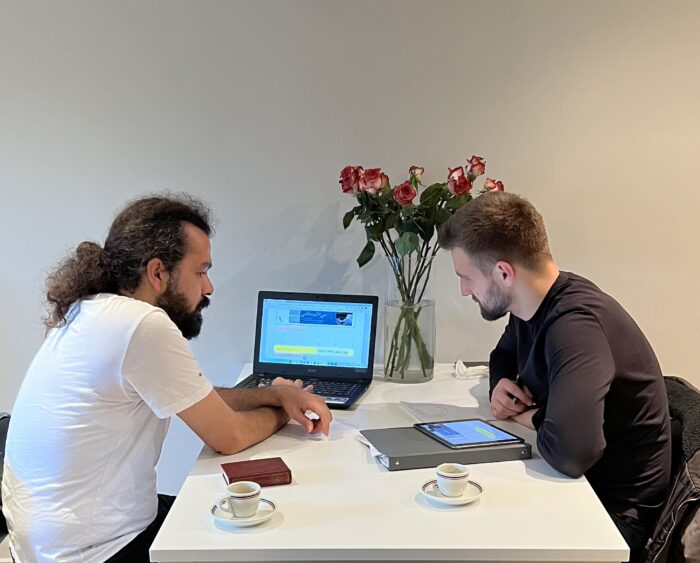Dutch Versus German Work Culture
In many regards, the Dutch versus German cultures are quite similar. For example, both Dutch and German people have a strong work ethic, place a lot of importance on punctuality and orderliness, and are very fond of their beer!
But there are a few key Dutch vs German differences too, and not just in the language! In this article, we will explore 4 corporate culture facts that you should be aware of before your next business trip. After reading our blog, you will be able to decide who is the winner in this Dutch versus German cultural contest.
Table of Contents
→Sign Up Now: Free Trial German Lesson With a Native Teacher!←
Dutch versus German Work Culture – 1: Formality
When it comes to the workplace, the Dutch and Germans have different ideas about how formal aspects should be conducted. In Germany, it is customary to always address your boss with Sie (you), while in the Netherlands it is more common to use the informal form of address (Toon). In addition, Germans are often more formal when it comes to business dress, while the Dutch tend to dress more informally.
Another difference between German and Dutch workplaces is the way in which employees interact with each other. In Germany, it is common for employees to keep to themselves and not socialize too much with their colleagues. This is not the case in the Netherlands where coworkers often go for drinks after work or spend time together outside of work.

Image by Askar Abayev, via Pexels
When it comes to working hours, the Dutch have a much more relaxed attitude. In the Netherlands, it is not uncommon for employees to take a few hours off in the middle of the day to go home and have lunch with their family or take a nap. This is not something that German people would tolerate. In Germany, bosses expect workers to be at their desks during working hours.
The Netherlands vs Germany: So, what country is more formal?
All in all, the first Dutch versus German round has a clear result: German corporate culture is much more formal. This is mainly due to the language and dress codes in both countries, but also because of their different attitudes towards work. The Dutch tend to be more relaxed and less structured in their approach to business, while Germans take a more serious and organized approach.
Dutch versus German Work Culture – 2: Business Meetings
In Germany, meetings tend to be much more formal and structured than in the Netherlands. There is often a clear agenda and discussions are typically very concise. In the Netherlands, meetings are generally less structured and more open-ended. This means that there is often more time for small talk and informal discussions.
When it comes to making decisions, the German approach is typically very rational and based on facts and figures. The Dutch, on the other hand, tend to be more flexible and are often willing to compromise. This difference can sometimes lead to misunderstandings, so it’s important to be aware of it when doing business with either of these countries.
The Netherlands vs Germany: Different approaches to formal meetings
If you like structure, you will agree Round 2 goes to the Germans who are much more likely to have structured, fact-based meetings. However, if you appreciate the opportunity for more open-ended discussions and flexibility, then the Dutch approach may be better suited to your needs.
Dutch versus German Work Culture- 3: Authority and Hierarchy
In the German corporate culture, there is a clear hierarchy and employees are expected to respect those in positions of authority. This is not always the case in the Netherlands where employees are often more egalitarian. This difference may come from the historical power dynamics between these two countries. For centuries, the Netherlands was a republic while Germany was ruled by an emperor. This has led to different ideas about authority and hierarchy in these two cultures.
The Netherlands vs Germany: The importance of hierarchy
While it would be easy to say that the Dutch have won this Dutch versus German round, it really depends on your working style. If you are someone who thrives in a structured environment where hierarchical dynamics are clear, you will love working in Germany. On the other hand, if you enjoy workplaces where everyone can communicate on an equal footing, and decisions are based on open dialogue and compromise, the Netherlands is the place for you.
Dutch versus German Work Culture – 4: Perks
In the Netherlands, it is common for employees to receive a number of perks and benefits, such as free lunches, gym memberships, and transportation allowances. This is not always the case in Germany, where these benefits are not as common.

Image by Andrea Piacquadio, via Pexels
On the other hand, German workers are often given more vacation days than their Dutch counterparts! This means that they can take more time off to explore their country or the world.
The Netherlands vs Germany: What country has the best perks?
Who is the winner of this Dutch versus German round is up to every person. Would you prefer to have more perks on a daily basis, or get more vacation days but fewer extra benefits?
Let us know on our social media.
Cultural Differences Between The Netherlands and Germany: FAQs
How is the work culture in Germany different from the Netherlands?
To sum up what we’ve said before, structure and hierarchy are more important in Germany, while the Dutch prefer a relaxed, egalitarian approach to work. Stress management is also different — in Germany, stress can be seen as a motivator while in the Netherlands it’s viewed more negatively.
Is living in Germany better than the Netherlands?
The ultimate Dutch versus German question comes down to personal preference. Some people might prefer the structure and order of a German lifestyle while others might prefer the relaxed atmosphere of the Netherlands. However, German does fare a little better in terms of living costs and quality of accommodation.
Is it better to learn Dutch or German?
Strictly speaking, it depends on where you’ll be living or working. However, as Dutch and German have a lot in common, learning either language will give you access to both countries’ cultures. However, there is one thing to bear in mind, if you are a native speaker of English or French, Dutch will be just simpler to understand! So, if you’re looking for a fairly easy language to learn, you know who is the winner of this Dutch versus German dilemma.
Study Dutch or German with Language Trainers
Would you like to become fluent in either Dutch or German? You’ve come to the right place. At Language Trainers, we work with fully qualified language teachers who also happen to be native speakers of the languages they teach.

Sydney Carroll, a travel nurse from Chicago, recently took a German course with us online and had this to say about the experience.
“I’m enjoying my classes very much! The pace is appropriate and I’m getting exactly what I was looking for, which is to actually speak German to someone. I still freeze up a bit but I’m feeling more confident every day. I also surprisingly like the grammar part of it. It is something I feel I would’ve had a hard time learning myself, and I appreciate having a teacher to ask questions to. Chris also will give me homework, which I have asked for because it helps keep me motivated throughout the weeks when I don’t have class. Overall, it’s been a great experience with Chris.”
→Sign Up Now: Free Trial Dutch Lesson With a Native Teacher!←
Would you like to learn German (or Dutch!) with a native teacher without leaving the comfort of your home? Send us a message now and we’ll match you with one of our tutors for a free trial online lesson.
